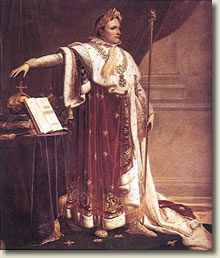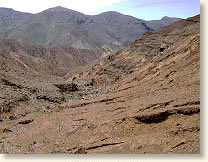|
Napoleon Exiled to St. Helena, 1815
 |
The Emperor Napoleon
|
After his defeat at the Battle of Leipzig in October 1813, Napoleon retreated to Paris where (due to a lack of support from his military marshals) he was forced to renounce his throne in April 1814. The European powers exiled him to the island of Elba in the Mediterranean. Within eleven months, however, Napoleon was back on the European continent at the head of a hastily-raised army intent on restoring Napoleon to the throne of France. Napoleon's defeat came in June 1815 at the Battle of Waterloo.
This time, the European powers were not going to take any chances on Napoleon's possible return. They exiled him to the island of St. Helena - a barren, wind-swept rock located in the South Atlantic Ocean.
Among the small entourage that accompanied the deposed Emperor into exile was the Comte de Las Cases who kept a diary of his experience:
"August 10
This day we cleared the Channel. We had now entered upon the dreary unknown course to which fate had doomed us. Again my agonies were renewed; again the dear connections I had abandoned resumed their sway over my heart… Meanwhile we advanced in our course and were soon to be out of Europe. Thus, in less than six weeks, had the emperor abdicated his throne and placed himself in the hands of the English, who were now hurrying him to a barren rock in the midst of a vast ocean. This is certainly no ordinary instance of the chances of fortune, and no common trial of firmness of mind.
October 23-24
The Emperor Napoleon, who lately possessed such boundless power and disposed of so many crowns, now occupies a wretched hovel, a few feet square, which is perched upon a rock, unprovided with furniture, and without either shutters or curtains to the windows. This place must serve him for bedchamber, dressing room, dining room, study, and sitting room; and he is obliged to go out when it is necessary to have this one apartment cleaned. His meals, consisting of a few wretched dishes, are brought to him from a distance, as though he were a criminal in a dungeon. He is absolutely in want of the necessaries of life: the bread and wine are not only not such as he has been accustomed to, but are so bad that we loathe to touch them; water, coffee, butter, oil, and other articles are either not to be procured or are scarcely fit for use…
 |
St. Helena Island
|
We were all assembled around the emperor, and he was recapitulating these facts with warmth: 'For what infamous treatment are we reserved!' he exclaimed. This is the anguish of death. To injustice and violence they now add insult and protracted torment. If I were so hateful to them, why did they not get rid of me? A few musket balls in my heart or my head would have done the business, and there would at least have been some energy in the crime. Were it not for you, and above all for your wives, I would receive nothing from them but the pay of a private soldier. How can the monarchs of Europe permit the sacred character of sovereignty to be violated in my person? Do they not see that they are, with their own hands, working their own destruction at St. Helena?'
'I entered their capitals victorious and, had I cherished such sentiments, what would have become of them? They styled me their brother, and I had become so by the choice of the people, the sanction of victory, the character of religion, and the alliances of their policy and their blood. Do they imagine that the good sense of nations is blind to their conduct? And what do they expect from it? At all events, make your complaints, gentlemen; let indignant Europe hear them. Complaints from me would be beneath my dignity and character; I must either command or be silent.'"
References:
The account of the Comte de Las Cases appears in Robinson, James Harvey, Readings in European History (1906); Hamilton-Williams, David, The Fall of Napoleon: the Final Betrayal (1994).
How To Cite This Article:
"Napoleon Exiled to St. Helena, 1815", EyeWitness to History, www.eyewitnesstohistory.com (2004).
|






